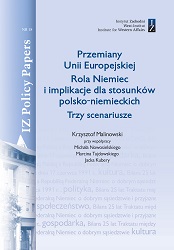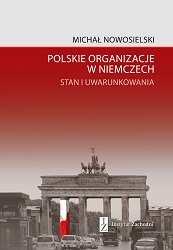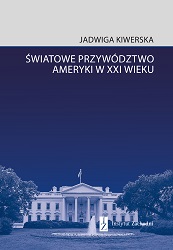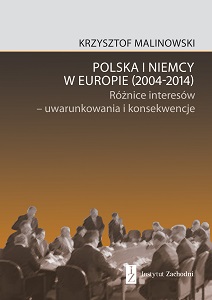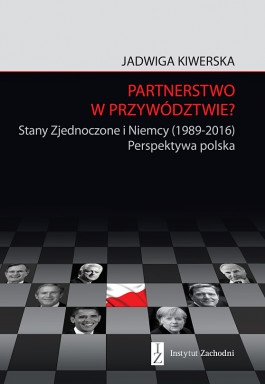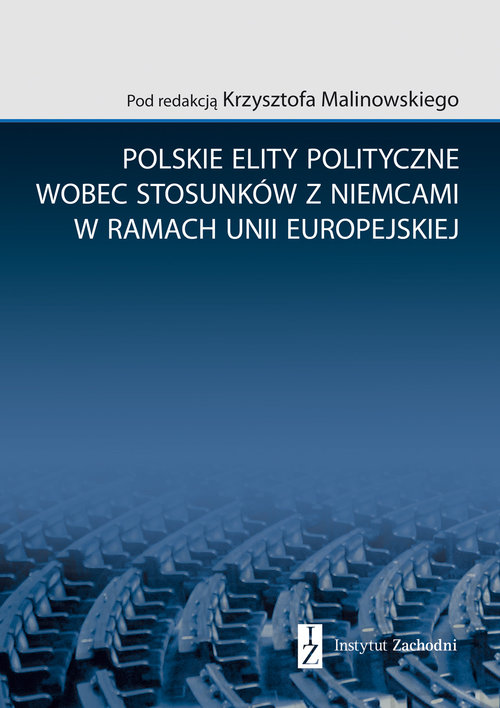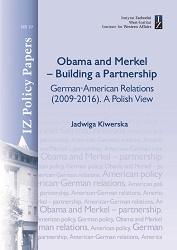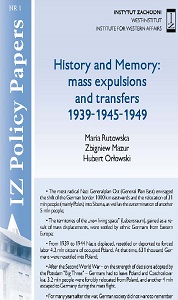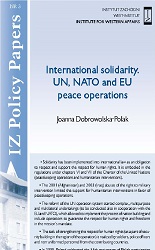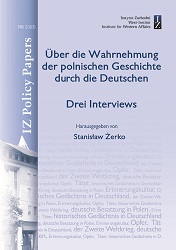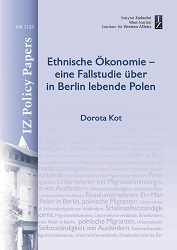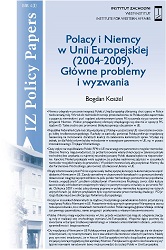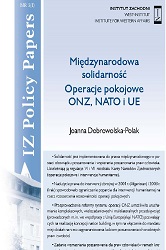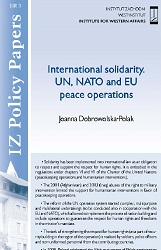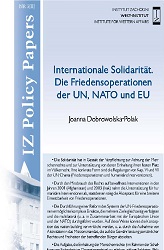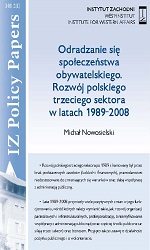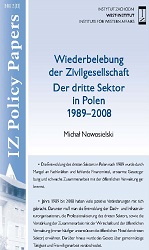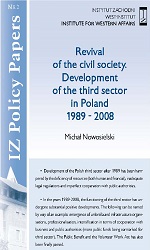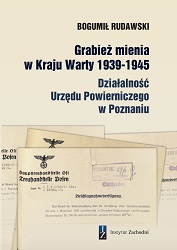Grabież mienia w Kraju Warty 1939-1945. Działalność Urzędu Powierniczego w Poznaniu
Author(s): Bogumił Rudawski / Language(s): Polish
Keywords: German occupation; Treuhandstelle; Haupttreuhandstelle Ost; Warthegau; Poznań
In 19391945, appropriations of assets from Poland’s citizens were a commonplace experience. Appropriations continued throughout the German occupation were part of the planned destruction of people’s existence. At the very beginning of the occupation various property rights of Polish citizens were limited by regulation, and property was seized by way of requisition or confiscation. In the Wartheland, as in all of Poland occupied by the Third Reich, appropriations took place on were a mass scale. They took two basic forms: robbery by German officials and civilians, and official expropriations, which were institutionalised. This second form proved to be more painful. Acts of appropriation were executed by purposefully established institutions of German state administration which organised and confiscated Poles’ assets.
Of these institutions, the most important was the Haupttreuhandstelle Ost (HTO), or the Main Trustee Office for the East, which covered Polish lands incorporated into Germany and some other parts of the German Reich. The HTO had several branches in the incorporated lands. In the Wartheland there was established the Treuhandstelle Posen, which had a subbranch in Łódź (Treuhandnebenstelle Litzmannstadt). The HTO and its regional branches formed the main part of the German trustee administration (Treuhandverwaltung). Institutions of this administration had a monopoly on property confiscations. The basic tasks of these institutions were to confiscate non-agricultural property of Polish citizens and to administer it until it passed to its new German owners, who were German settlers.. The HTO and its units expropriated the property from Polish citizens; then property administrators were appointed, and finally the property was transferred to Germans, who were the only group entitled to property allocation. This organised property transfer was one of the most important measures to Germanise the land and “strengthen” the German countenance of the occupied territory. Appropriations of Polish-owned businesses facilitated (despite some limitations) the building of the foundations of the German socio-economic order. Such plunder was motivated by the prospect of material gains. However, racist theories and their introduction in the territories incorporated into the Reich played an important role. The assets seized by the HTO were primarily real property, namely homes, industrial enterprises, shops and small workshops. In transferring them to Germans, the HTO devised a number of administrative procedures which in a sense neutralised the appropriation process and made it appear to be a “normal” administrative practice.
The Main Trustee Office for the East was established by Hermann Göring’s decree of 19 October 1939. This document was an attempt to secure Göring’s own economic interests in occupied Poland. The idea of a separate trustee administration was developed in the Office of the Four Year Plan, which Göring headed as plenipotentiary. At the time this was the most powerful economic office in the Third Reich. On 1 November 1939, an official communique was issued announcing the creation of the HTO. Its appointed head was Max Winkler.
The activities of the HTO as the main body of the trustee administration can be divided into stages. The first stage lasted until early 1940. In this period the focus was on controlling and subordinating various acts of expropriation and ensuring the dominant role of the HTO in the confiscation process. During this time local branches of the Main Trustee Office for the East were developed. Trustee offices were established in Katowice (Kattowitz), Gdańsk (Danzig, then Gdynia/Gdingen), Ciechanów (Zichenau) and Poznań (Posen). The activities of the HTO did not cover the Generalgouvernement zone. There, on 15 November 1939, Governor-General Hans Frank issued an ordinance establishing a separate trustee administration. Thus the HTO was responsible for managing private property only in the Polish territories that had been incorporated into the Reich. Also at this stage a division of competences was made between Hermann Göring and Heinrich Himmler, as the latter also wished to participate in the expropriations. On 10 November 1939 it was agreed that Himmler would be responsible for agricultural property confiscations and the HTO for all non-agricultural assets. The second period lasted until 1942. Here, the activities of the HTO focused on actual confiscations of assets from Polish citizens. The gains were redistributed and transferred to Germans, who were moved in to settle in the occupied lands. At that time there were also plans to expand the trustee administration to cover the occupied Soviet territories. In 1942, the third ordinance on the HTO limited the sale of expropriated property. This marked the beginning of the HTO’s gradual decline. The main factor which paralysed its activities was that its employees were increasingly being conscripted into the Wehrmacht, and thus the HTO’s plans and activities could not be executed effectively. In addition, in 1943 Göring lost interest in the HTO. In the second half of 1944 the evacuation of the HTO’s branches and agencies began, which in effect meant that the trustee administration ceased working.
The Wartheland was a “testing ground” for the organisation and execution of a planned and massive plunder of private assets as an element of economic and ethnic policies. The Treuhandstelle Posen began its operations on 6 December 1939, when its first manager, Hugo Ratzmann, was officially appointed. Initially the whole Wartheland territory was subject to the office’s operations. On 20 January 1940 a subbranch in Łódź was created. Nominally, this was subordinated to the office in Posen, but in practice it was independent and functioned as a separate establishment. On 1 May 1941 an agreement was signed whereby the Treuhandnebenstelle Litzmannstadt was made responsible for thewhole administrative district of Łódź while the office in Poznań was made responsible for the Poznań and Inowrocław (Hohensalza) administrative districts. The subbranch took an active part in the functioning of the Litzmannstadt Jewish ghetto. As a result of the establishment of trustee administration offices in the Wartheland, the appropriation of Polish assets was subjected to standardised criteria. Expropriations followed designed administrative procedures and were overseen by specialised German civil servants. The trustee office in Poznań carried on its operations until January 1945.
The trustee office in Posen performed four basic tasks in expropriating non-German assets in the Wartheland. These were: registration and record-keeping of assets, confiscations, provisional administration of confiscated assets by trustees (Treuhänder), and redistribution of the assets. In its first months the office concentrated on its own expansion and on establishing its role as the most important and only institution carrying out expropriations on a mass scale in the Wartheland. Its systematic operations to take over businesses that had already been confiscated by other German authorities – mainly the Chamber of Commerce and district administrators (Landrat) – ended in 1940. At that time the plenipotentiaries for counties (Kreise) played a crucial role in strengthening the office’s position. They represented the office at county level, and were responsible for the registration of assets to be confiscated and for safeguarding already confiscated real and movable property on the office’s behalf. On the pattern of the HTO in Berlin, the trustee office in Poznań had two main departments. During the time of its most vigorous growth, its department of administration had six subdepartments, while the economic department had as many as twelve. Each subdepartment of the economic department was responsible for confiscations of defined types of assets. For example, subdepartment B IVa oversaw the appropriation of industrial enterprises, and subdepartment B V was responsible for craft workshops. Additionally, the diversity of assets taken over motivated the creation of several specialised companies, which acted as receivers of some of the confiscated assets. One of the most important companies was the Auffanggesellschaft für die Kriegsteilnehmerbetriebe des Handels (company for taking over trading enterprises for the benefit of war participants), which bought trading enterprises from the trustee office for German soldiers. Another was the Grundstücksgesellschaft für den Reichsgau Wartheland, GEWA (real estate company), which took control over residential land and properties.
The takeover of Polish industrial enterprises, the larger ones in particular, was intended to strengthen the potential of German armament production and to increase the efficiency of the German economy in general. As a result of the trustee administration’s activities, Polish economic enterprises were not only confiscated, but also underwent concentration and transformation processes. This led to changes in the pre-war ownership structures. Many large and smaller enterprises were relocated. The equipment of manufacturing enterprises was destroyed and dispersed. The trustee office also closed and liquidated up to 37% of enterprises in the Wartheland, which it classed as unviable. These were mainly small trading firms and workshops, which were many people’s sole assets and source of income.
On 17 February 1941 the second HTO ordinance was issued, and the whole institution was decentralised. The trustee office in Poznań , which until then had been subordinated directly to HTO headquarters in Berlin, was now subordinated to the Reichsstatthalter (governor) of the Wartheland, Arthur Greiser. In addition, HTO’s regional branches could no longer manage economic entities whose value exceeded 500,000 Reichsmarks – these would be managed instead by the authorities in Berlin. In the case of the Wartheland there were 133 such enterprises, which were left in the hands of Göring.
According to archived documents, by May 1943 the Treuhandstelle Posen and Treuhandnebenstelle Litzmannstadt had confiscated over 49,000 industrial enterprises, trading establishments and workshops. By the end of World War II this number had risen to around 60,000. The real estate company Grundstücksgesellschaft für den Reichsgau Wartheland took possession of over 400,000 homes. In 1944 the value of the assets taken over by the trustee offices in the Wartheland amounted to 266 million Reichsmarks. Of all of the HTO’s branches, it was those in Poznań and Łódź that generated the highest proceeds: 12% of the HTO’s total proceeds, which by March 1945 totalled 2.1 billion Reichsmarks. To this sum should be added the value of assets taken over by dependent companies, and the value of large enterprises which were not included in the financial statements of the regional branches. Taking these into account, it can be estimated that the value of assets confiscated by the HTO in the Wartheland amounted at least to 450 million Reichsmarks.
The plundering policy of the trustee administration caused the total destruction of the private sector economy and the pre-war ownership structure. The ruthless economic exploitation affected all spheres of socio-economic life. It ruined Poland’s national assets and the private property of most Polish families. It was not only material losses that Poles suffered. Excluded from political, cultural and economic life, they were exploited as cheap labour in German enterprises.
The appropriation of Polish assets by the HTO and its branches greatly facilitated the ownership transformations and nationalisation of the entire economy in Poland after 1945, as it destroyed the institutional and personal continuity of ownership. The economic and social consequences of the HTO’s policies turned out to be extremely far reaching.
More...
